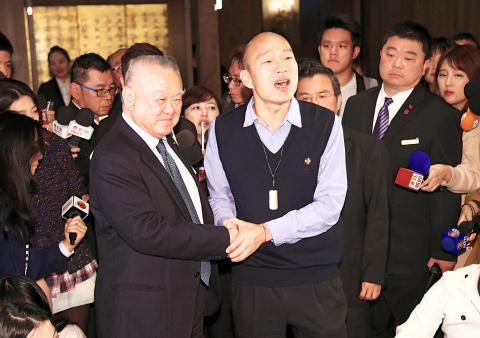Kaohsiung Mayor Han Kuo-yu (韓國瑜) on Thursday sought to assuage controversy over remarks he made about Filipino white-collar workers, saying that Taiwanese parents would need time to accept Philippine English teachers.
At a meeting of the Chinese National Association of Industry and Commerce in Taipei on Wednesday, Han said he feared that hiring educated employees from the Philippines “would cause a psychological shock for Taiwanese, because [they might wonder]: How come our ‘Maria’ has become a teacher?”
The term “Maria” is a slur widely used in Taiwan to refer to migrant workers, especially those working as a caregivers.

Photo: CNA
Han made the remark after a participant said that Kaohsiung’s lack of highly educated workers is the city’s biggest problem, especially middle and top-tier professionals who speak English and are internationally mobile.
The mayor should cooperate with the national government and local enterprises to bring in white-collar, English-speaking workers from the Philippines, the participant said.
Kaohsiung already has many highly educated residents, but the problem is a high outflow rate, at about 74 percent, Han said, adding that his administration has added NT$27 million (US$873,730) to the city’s original budget of NT$20 million for the implementation of bilingual education.
“This [pushing for bilingual education] is not easy due to the rural-urban disparity and the difficulty in finding foreign teachers,” he said, adding that Taiwan could learn from the Philippines, but parents must first be “mentally prepared.”
Han’s remarks drew an immediate backlash from netizens, who accused the mayor of discriminating against Filipinos.
A person’s value is not determined by their skin color, weight, appearance, gender, sexual orientation, occupation or nationality, said Chou Juo-chen (周若珍), a Japanese teacher.
The majority of Southeast Asian workers in Taiwan are employed in labor-intensive industries, but that does not mean that their countries do not have highly educated professionals, Chou said, calling Han’s comments “discriminatory and ignorant.”
In an attempt to assuage public criticism on Thursday, Han said that his comments were not meant to discriminate against Filipinos.
“We just have to figure out a way to mentally prepare the parents and [explain to them] why we do not look to the US or the UK” for English teachers, he said.
Democratic Progressive Party Legislator Lin Shu-fen (林淑芬) said on Facebook that the real problem is not “why Maria has become a teacher,” but rather that Taiwanese only want “cheap white-collar employees” from the Philippines.
“What the bosses care about is not professionalism, but low prices,” Lin said, adding that Taiwanese businesspeople have gone from asking for cheap blue-collar workers to cheap white-collar workers.
Foreigners “employed in specialized and technical” work and teaching jobs must earn at least NT$47,971 per month to qualify for a work permit, with some exceptions, the Workforce Development Agency says on its Web site.
The minimum monthly wage for Taiwanese is NT$23,100.
Additional reporting by staff writer

Chinese Nationalist Party (KMT) Chairman Eric Chu (朱立倫), spokeswoman Yang Chih-yu (楊智伃) and Legislator Hsieh Lung-chieh (謝龍介) would be summoned by police for questioning for leading an illegal assembly on Thursday evening last week, Minister of the Interior Liu Shyh-fang (劉世芳) said today. The three KMT officials led an assembly outside the Taipei City Prosecutors’ Office, a restricted area where public assembly is not allowed, protesting the questioning of several KMT staff and searches of KMT headquarters and offices in a recall petition forgery case. Chu, Yang and Hsieh are all suspected of contravening the Assembly and Parade Act (集會遊行法) by holding

PRAISE: Japanese visitor Takashi Kubota said the Taiwanese temple architecture images showcased in the AI Art Gallery were the most impressive displays he saw Taiwan does not have an official pavilion at the World Expo in Osaka, Japan, because of its diplomatic predicament, but the government-backed Tech World pavilion is drawing interest with its unique recreations of works by Taiwanese artists. The pavilion features an artificial intelligence (AI)-based art gallery showcasing works of famous Taiwanese artists from the Japanese colonial period using innovative technologies. Among its main simulated displays are Eastern gouache paintings by Chen Chin (陳進), Lin Yu-shan (林玉山) and Kuo Hsueh-hu (郭雪湖), who were the three young Taiwanese painters selected for the East Asian Painting exhibition in 1927. Gouache is a water-based

Taiwan would welcome the return of Honduras as a diplomatic ally if its next president decides to make such a move, Minister of Foreign Affairs Lin Chia-lung (林佳龍) said yesterday. “Of course, we would welcome Honduras if they want to restore diplomatic ties with Taiwan after their elections,” Lin said at a meeting of the legislature’s Foreign Affairs and National Defense Committee, when asked to comment on statements made by two of the three Honduran presidential candidates during the presidential campaign in the Central American country. Taiwan is paying close attention to the region as a whole in the wake of a

OFF-TARGET: More than 30,000 participants were expected to take part in the Games next month, but only 6,550 foreign and 19,400 Taiwanese athletes have registered Taipei city councilors yesterday blasted the organizers of next month’s World Masters Games over sudden timetable and venue changes, which they said have caused thousands of participants to back out of the international sporting event, among other organizational issues. They also cited visa delays and political interference by China as reasons many foreign athletes are requesting refunds for the event, to be held from May 17 to 30. Jointly organized by the Taipei and New Taipei City governments, the games have been rocked by numerous controversies since preparations began in 2020. Taipei City Councilor Lin Yen-feng (林延鳳) said yesterday that new measures by